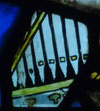CONFERENCES
Unwanted organs -
what is their future?
Conference, Saturday 23rd September 2017
St Stephen's church, Rosslyn Hill,
Hampstead, London NW3 2PP
Aims of conference:
To see what systems are currently in place in the various 'exempt denominations' to safeguard organs, and how well these systems are working.
- To share good and bad experiences, and
- to see if in the new era of Sustainability, organs can be better protected.
- To discuss how they might be maintained in playing condition, and
- to see how they might be used more for cultural purposes and teaching.
- To explore what might be done with good organs that need to be moved - do they really have to go abroad? What organs need to be kept in the UK 'at all costs', and what systems are in place to achieve this aim?
Chair: Peter Burman
Special guest: Judith Weir
Composer-in-residence: David Loxley-Blount
Organ players: Timothy Roberts, Paul Nicholson
Films: by James Dawson, specially made for the conference
You can download the conference programme here: programme (pdf).
You can download an information sheet on the organs at the conference: conference organs (pdf).
Proceedings of the conference:
(You can download pdf documents by clicking on the blue links)
Morning session: the present situation
1. Background
Peter Burman, chair Welcome & Introduction
Martin Renshaw 'Sustainability' and other current issues (pdf)
Peter Burman Faculties and Exemptions (pdf)
Further material will be appearing here in the next few weeks:
2. How do Churches look after, and are advised about, their organs?
John Norman The Church of England
The Church Commissioners - a statement read by Peter Burman
John Rowntree The Roman Catholic Church
John Currie, URC advisor - a statement read by Martin Renshaw
David Wilks The Methodist church
Interval for 6-minute film about the organ at Winston (Tees-side, Durham) Methodist Church - James Dawson
3. Responding to the situation
David Shuker The British Institute of Organ Studies
Rachel Morley The Churches Conservation Trust (pdf)
Anthony Richardson The Victorian Society
4. At the coal face
Paul Nicholson An Anglican priest-in-charge
Ewan King A Baptist minister
David Walmsley and Jonathan West Working with Heritage Lottery Fund (Horsley Organ Project, Northumberland)
Afternoon session: responding to the situation
2 to 3 pm: Discussions:
A. Led by John Rowntree: Wheat and chaff... how do you sort out good from less good organs?
Crisis management: how should we alert the press, DACs etc to problems with significant organs?
Organs in proposed 'Festival' churches : how can they be kept in good order with infrequent use?
B. [led by David Wilks?] Should we copy the Breton internet solution to finding organists for every service, to help keep up the profile of organs and their music? Who will run this - would organists' associations or e.g. concert sites?
C. Led by David Shuker: Why is there no museum of organs in UK? Should we celebrate organists and organ-builders with (blue) plaques (e.g. CS Barker at Snodland, or Willis in e.g. Hampstead)? Where might there be permanent educational exhibitions, 'how-they-work' spaces? Who would look after them?
D. Led by Peter Burman: Should all faculty and other procedures to get rid of organs be challenged, as a matter of course - with legal backing? Who has the nerve to do this? Do we need to set up an Association or pressure group to do this sort of work? Pressure groups - do they work over the long term? How do they work best? If there was such a group, how should it be run, and by whom?
E. Led by Martin Renshaw: Training of advisers; training of local groups to cope with potential sustainability problems? And how will we train the next generation of players and organ builders?
F. Led by John Norman: What are the worst enemies of organs and what can be done about them? For instance:
Organ-builders' 'death estimates', where the best drives out the good. The ingrained disinclination of o-b's to share skills and experiences widely, though experience in other professional fields shows that this leads to more, not less, work.
Organists who say that such and such an organ is 'no good/doesn't work' and so 'I won't play it', so church people think "if players can't agree, why should we bother with organs or raise money for them".
Bad publicity that harps on about cost rather than benefit.
Neglect and mice - see above re. festival churches.
The 'carpet fairy' who ruins the acoustic of churches, and halves the musical effect of organs, and the microphone salesman who comes along afterwards.
G. Led by Rachel Morley: Might CCT churches sometimes house really worthwhile unwanted organs, temporarily or permanently, because there is no organ store or 'recycling' system in UK?
Might CCT churches also help mount organ training days (to maintain organs, as above) and also include organ skills, e.g. pipe-making and voicing/tuning, leather-work, making keyboards etc. in their craft skills exhibition days?
Importantly, if CCT does this, what support might it receive in return?
H. Led by David Walmsley and Jonathan West: Heritage Lottery Fund: who will do the paperwork needed for applications? Is there real help for this when there are small congregations and time is at a premium? Should there be a Federation set up by those who have been or are dealing with HLF to help those
hesitating to set up projects? How else might applications be supported?
Information about the concert can be found here concert programme (pdf)

Note: Logo reproduced by kind permission of the Chapter of Durham Cathedral.
|